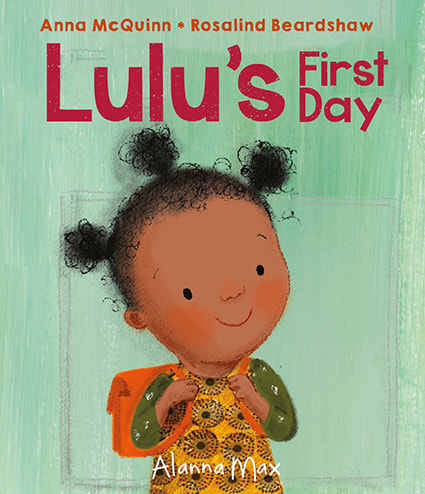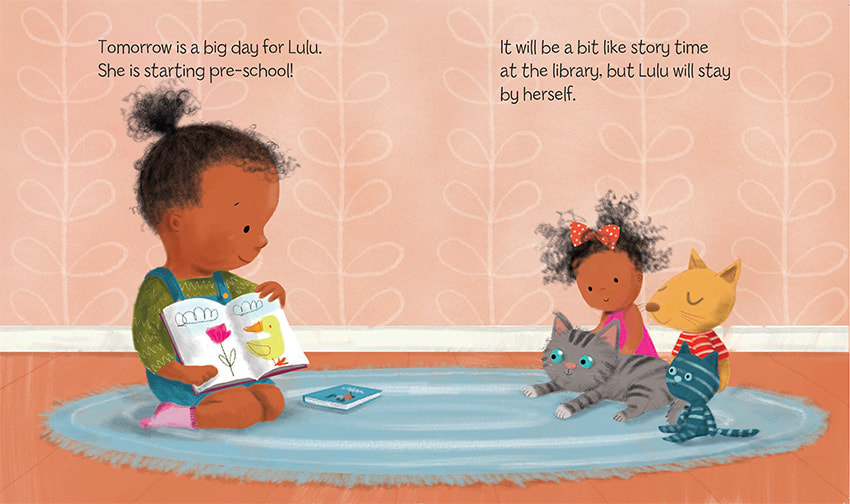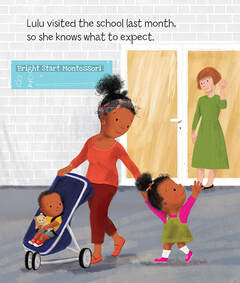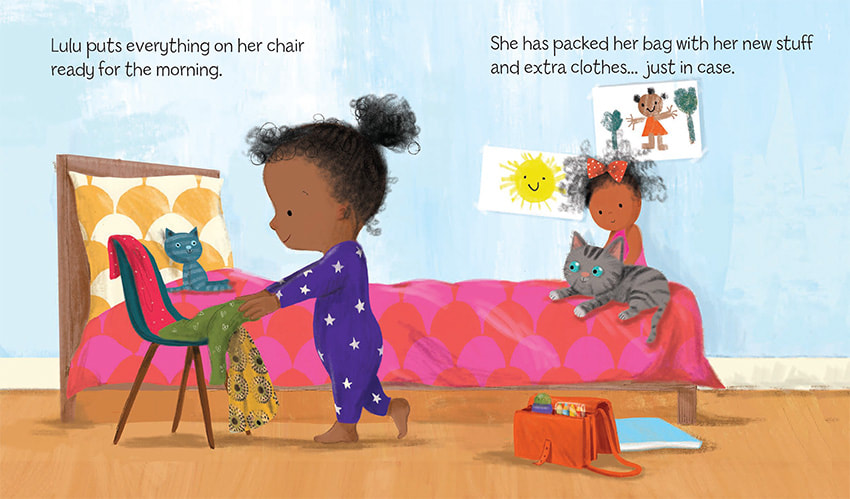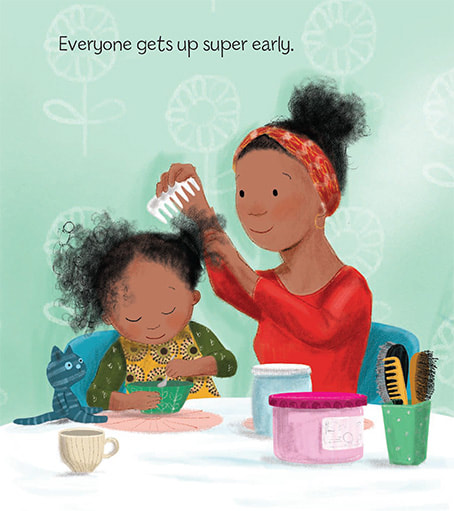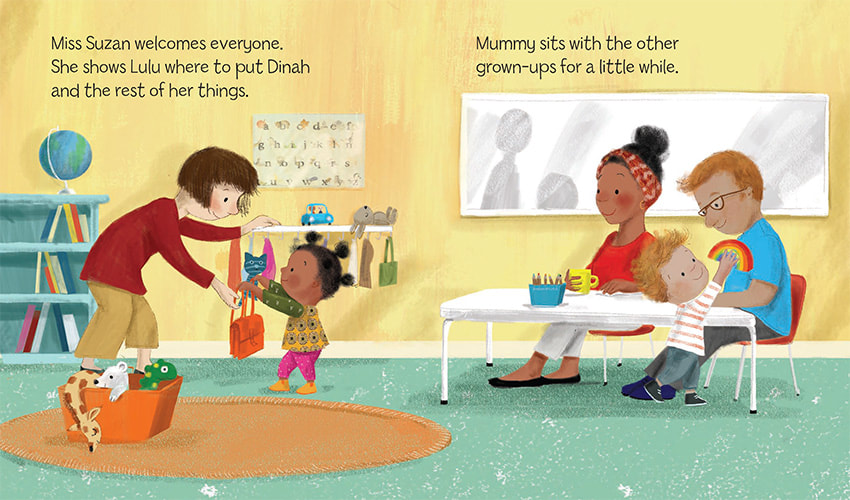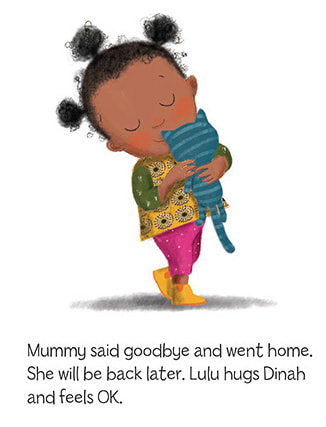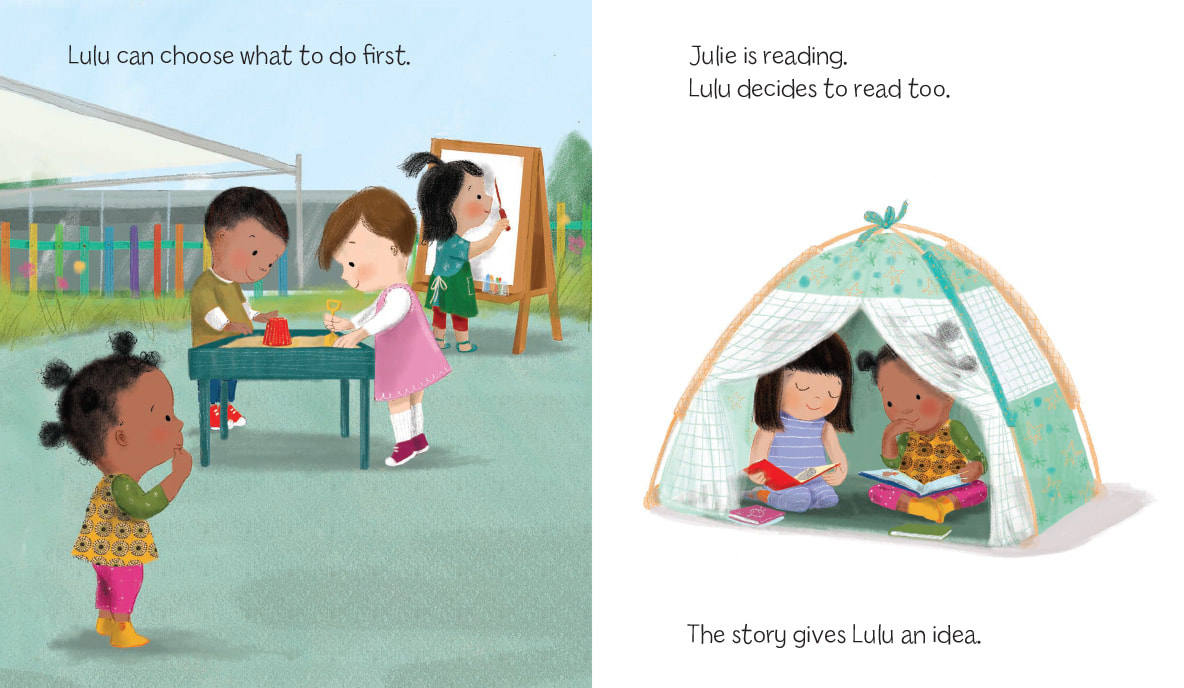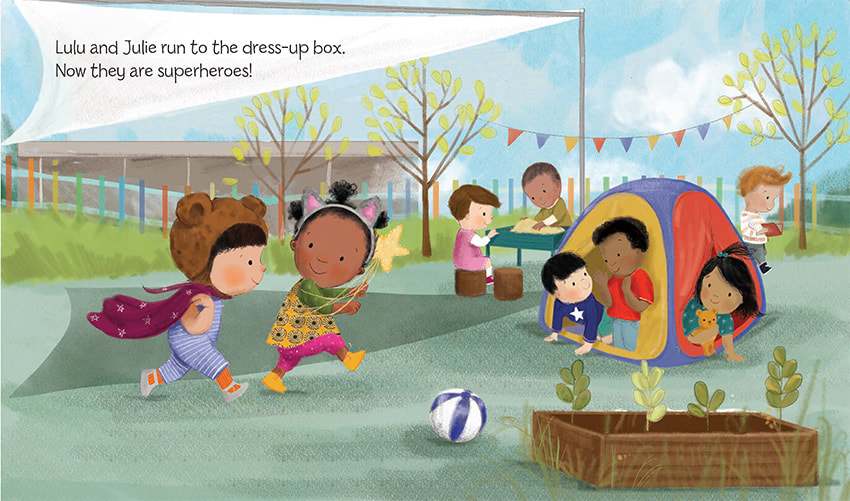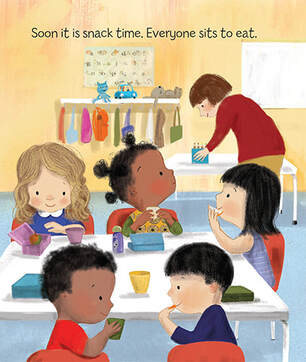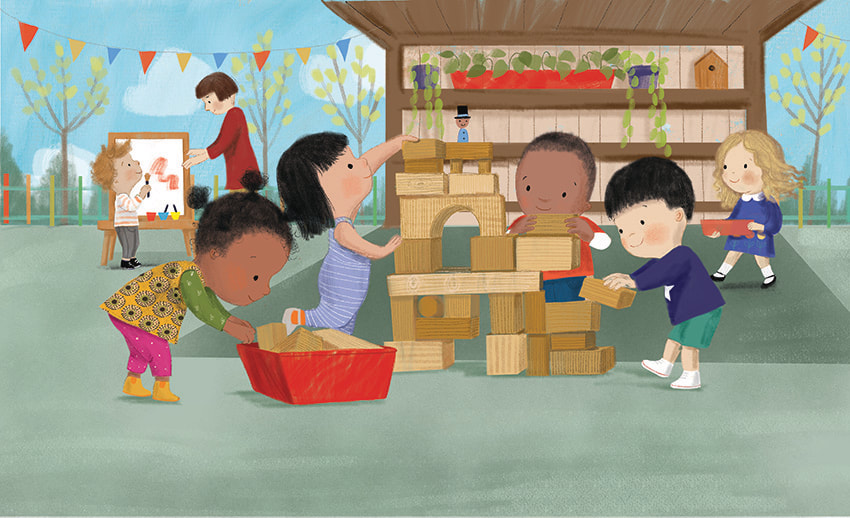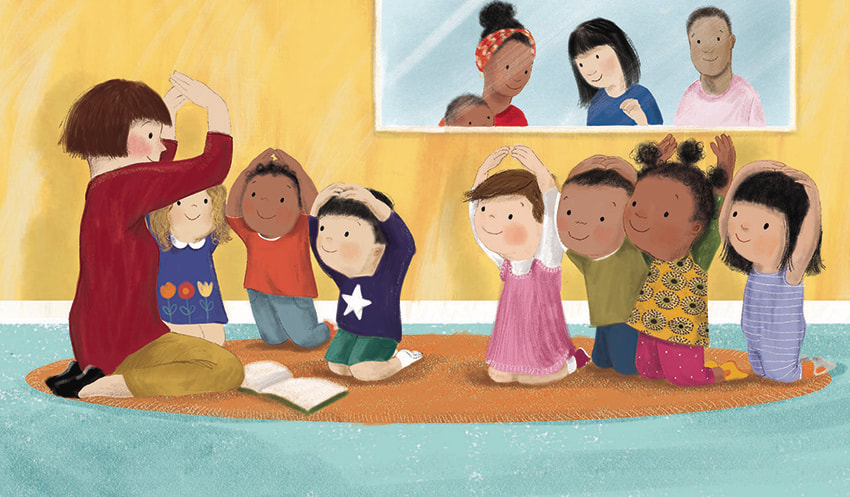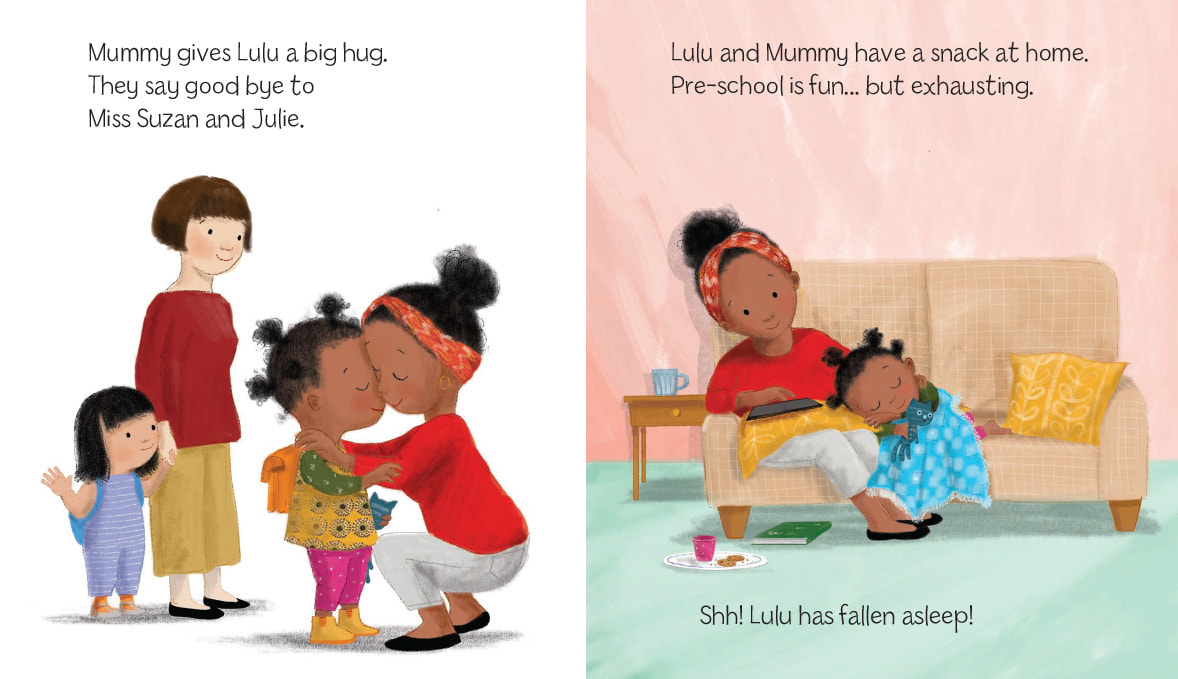Starting school or pre-school
Happily I'm getting lots of positive comments about this book -
so I thought it might be useful to put down some of the thinking behind the choices I made when writing the story and ways in which you as a parent or carer, early years educator or teacher might like to use it. There are so many books about anxious first days of school — this one is refreshingly different. First days – at nursery, play school, pre-school or 'big school' – are huge milestones for young children. (And in recent times, returning after long periods at home during Covid restrictions has been hard for many little ones).
As Afoma says in the review quoted above, there are many books which address the anxieties surrounding this head on. I decided to take a slightly different approach and write a positive story. My intention was not to avoid or downplay any anxieties, not at all!
I just decided not to name them as such, but instead to show ways to prevent worries, to address issues and to talk about what might happen without raising additional anxieties (that a child might not have thought of and so make them anxious). I wanted to deal with worries instead in a subtle way – leaving space for parents and carers to stop at any point and explore further, talk through worries and offer reassurance. And to focus on the positives. |
Ever so gently acknowledges that sense of anxiety that comes from being in an unknown situation whilst celebrating the exciting opportunities that come with attending school... |
In showing how Lulu and her family prepare and deal with her first day, I also wanted to present ideas that families can try, and show that children themselves can have agency in preparing for and dealing with new experiences – something that will build their confidence in dealing with other new things in the future.
So, the first image in the story is Lulu 'playing school' with her toys.
|
For so many children, play is a rehersal for life and a way to explore how they feel about new experiences, it's a way to process what they see and experience.
So 'playing school' is an imaginative response to the milestone ahead (and will be a way to process the new experience in the days that follow). Readers are also told that it will be a bit like going to the library – placing this new event in the context of similar experiences Lulu has had in the past helps her feel confident that this is close to something she already knows. She has visited the school so she knows what to expect. Parents and teachers know that preparation for a new experience really helps to diffuse anxiety. Mummy helps her to chose something practical to wear - something suitable for physical activity and getting messy, so she can join in whatever she wants versus being worried about getting clothes dirty. |
Lulu gets everything set the night before.
When I worked as as part of a Sure Start family support team, I was often surprised that parents didn't plan more for a first day.
Adult readers will know that Mummy has helped, but Lulu shows child readers how much they can do themselves.
Making choices and having agency helps children to feel confident, and making time in the days before to plan and choose will really help.
Lots have children can have 'accidents' during their first days at school but I didn't want to dwell on this and raise worries for children. Packing some extra underwear without fuss or comment - just in case - is a wise precaution. And adult readers can use this moment in the book as an opportunity if necessary to remind children how to ask where the toilet is - again, without making a fuss.
Mummy plans extra time in the morning too – so nobody gets rushed. All of these preparations help and it's not a surprise that Lulu can approach the day feeling in control, calm and confident.
When I worked as as part of a Sure Start family support team, I was often surprised that parents didn't plan more for a first day.
Adult readers will know that Mummy has helped, but Lulu shows child readers how much they can do themselves.
Making choices and having agency helps children to feel confident, and making time in the days before to plan and choose will really help.
Lots have children can have 'accidents' during their first days at school but I didn't want to dwell on this and raise worries for children. Packing some extra underwear without fuss or comment - just in case - is a wise precaution. And adult readers can use this moment in the book as an opportunity if necessary to remind children how to ask where the toilet is - again, without making a fuss.
Mummy plans extra time in the morning too – so nobody gets rushed. All of these preparations help and it's not a surprise that Lulu can approach the day feeling in control, calm and confident.
|
Usually children have to put their toy (or other personal item such as photo) in a special spot – it's good to explain this.
Parents are usually encouraged to wait until children are settled. Lulu's mummy will say a quick goodbye later - no drama! We will see Lulu's little toy cat later – once again, I decided not to dwell on why Lulu suddenly had an emotional wobble but to focus instead on her cuddle. Instead of naming fears head on, I've tried to simply make spaces so that a parent who knows any a particular point of concern can linger on that moment and reassure. |
Different setting have different rules, so it's worth parents finding out whether their little one can bring a loved toy (or anything) from home to help with the transition. |
What if |
In one of the picturebooks I read while researching the topic, the child character in the story says, "what if nobody likes me?" and I was horrified! Most children don't think this way and I felt that this comment would raise anxieties that might never have occurred to little readers.
Which is not to say there aren't lots of anxieties around friendship-making – for parents as much as for children. One of the first questions asked of children is often, "did you make a friend?" Making a friend is seen as a sign of settling well, and a 'yes' is met with relief - it's a badge of success. |
In reality though, making friends can be complicated. So I wanted to explore the topic in some detail in the story.
Some children make friends easily – my younger brother would have a new friend at the end of a 15 minute train journey!
Others take longer, and some are happy in their own company. Where a child is, developmentally, can also influence things.
Lulu, though she is well prepared for her first day, is a little tentative. She hangs back and watches the other children at first.
Hassan and Mia (I named all the children so they would be 'real to me') are playing happpily side-by-side* and Nina is quite contendedly painting on her own.
Some children make friends easily – my younger brother would have a new friend at the end of a 15 minute train journey!
Others take longer, and some are happy in their own company. Where a child is, developmentally, can also influence things.
Lulu, though she is well prepared for her first day, is a little tentative. She hangs back and watches the other children at first.
Hassan and Mia (I named all the children so they would be 'real to me') are playing happpily side-by-side* and Nina is quite contendedly painting on her own.
Lulu sees Julia is reading and, as a little book-lover herself, feels comfortable joining her, sitting alongside and reading too.
Until the story giver her and idea...
Until the story giver her and idea...
|
Here and in the following pages are presented a range of children and relationships.
So we see Lulu and Julie are tentatively becoming friends. Mia and Hassan are still playing side by side at the sand box; Philmon and Tien are firm friends already and playing together in the tent; Nina has finished her painting and is content on the fringes of the game in the tent. Rory is reading by himself. This continues through to snack time. Lulu and Julie are adjacent – gradually getting to know one another, Philmon and Tien are best buddies and Anna is content eating by herself. In the final 'play' scene, building a castle draws children together in a collaborative project, Anna is still happy by herself and Rory is getting support from Miss Suzan. In the final school scene, Miss Suzan leads the Goodbye Song, the children are in friendship groups – except for Rory, who finds this kind of activity a little overwhelming. |
Miss Suzan is named for a very good friend, Suzan Issa, who consulted on the project. A pre-school special needs specialist at the time (now a consultant), Suzan is passionate about the need to understand children's friendships – the pressure on children to make friends quickly, and the need for adults (both parents and teachers) to accept children who make relationships at a slower pace or who are content in their own company.
She helped me to understand that unless the child themselves was distressed by not making a special friend, we should give them space to interact at their own pace. So I tried to represent this in the range of children and friendships in the story. I'm hoping all children will see someone/behaviour/friendship that they can identify with.
She helped me to understand that unless the child themselves was distressed by not making a special friend, we should give them space to interact at their own pace. So I tried to represent this in the range of children and friendships in the story. I'm hoping all children will see someone/behaviour/friendship that they can identify with.
Before Lulu knows it, her first day is over and Mummy is outside to collect her – a wonderfully tender moment captured so beautifully by the illustrator Rosalind Beardshaw - and which just hints at the momentous feelings. It's no wonder then that instead of being able to fill Mummy in on everything that's happened, Lulu falls asleep, exhausted (another 'nod' to the big emotional day she's had).
So, I hope that in reading this, it's apparent that this is not a story which is naively positive or glosses over the very real anxieties both children and their parents have at big milestones like starting school. Rather, I hope you will see that it's a story that creates spaces for parents (or teachers) and children to safely and sensitively explore any worries (without raising more) as well as showing some positive steps families can take to prepare for this big event so that readers can, like Lulu, greet the day with enthusiasm!
Click HERE for tips for parents
Click HERE for tips for parents
Comments & reviews
This delightful glimpse into Lulu’s first day at school makes for a reassuring companion for young readers, creating opportunities for conversations about this milestone moment, whilst revelling in the excitement and fun of it all. - Farrah Serroukh, CLPE Question on Twitter & responses – |
The Lola books are perfectly pitched to a young child's view of the world. Another outstanding book in this series. It's a big day for Lulu - and she's put a lot of thought into her preparations. |
